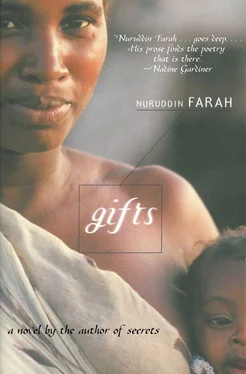Nuruddin Farah - Gifts
Здесь есть возможность читать онлайн «Nuruddin Farah - Gifts» весь текст электронной книги совершенно бесплатно (целиком полную версию без сокращений). В некоторых случаях можно слушать аудио, скачать через торрент в формате fb2 и присутствует краткое содержание. Год выпуска: 2011, Издательство: Arcade Publishing, Жанр: Современная проза, на английском языке. Описание произведения, (предисловие) а так же отзывы посетителей доступны на портале библиотеки ЛибКат.
- Название:Gifts
- Автор:
- Издательство:Arcade Publishing
- Жанр:
- Год:2011
- ISBN:нет данных
- Рейтинг книги:3 / 5. Голосов: 1
-
Избранное:Добавить в избранное
- Отзывы:
-
Ваша оценка:
- 60
- 1
- 2
- 3
- 4
- 5
Gifts: краткое содержание, описание и аннотация
Предлагаем к чтению аннотацию, описание, краткое содержание или предисловие (зависит от того, что написал сам автор книги «Gifts»). Если вы не нашли необходимую информацию о книге — напишите в комментариях, мы постараемся отыскать её.
Gifts — читать онлайн бесплатно полную книгу (весь текст) целиком
Ниже представлен текст книги, разбитый по страницам. Система сохранения места последней прочитанной страницы, позволяет с удобством читать онлайн бесплатно книгу «Gifts», без необходимости каждый раз заново искать на чём Вы остановились. Поставьте закладку, и сможете в любой момент перейти на страницу, на которой закончили чтение.
Интервал:
Закладка:
There was energy to Duniya’s decision not to argue out the point with either Nasiiba or Yarey, which was why she encouraged them in a gentle way to get back to what they were doing.
“Of course,” said Bosaaso, “the poor things don’t seem to realize not only that this is a neo-colonial tradition, inherited, along with the idea of flags, a state capital and such paraphernalia, but also that embed-ded in it is a very male notion in which an innocent young virgin dressed in white is offered to a visiting man who happens to be a head of another state. I needn’t remind you that in our own tradition a man whose honour is wounded is often rewarded with a maiden as part of the compensation given him. And when male friends visit their own kind in another town, the host provides his guest with a woman to entertain him.”
“Maybe you should tell them,” said Duniya.
“It would probably spoil their fun,” said Bosaaso.
“That’s possible,” Duniya agreed.
They both fell silent and solemn, like people entering a place of worship. Both were thinking about Abshir and each was looking forward to being reunited with him. Separated by their thoughts, each held on to a pleasant memory, a keep-sake of tenderness from the night before. For her part, she was proud that she hadn’t told him whether she would marry him or not; for his, he took pride in the fact that he wasn’t insisting she tell him her decision.
Welcome, Abshir, my darling brother, Duniya said to herself.
18
In which Duniya, together with her children, Bosaaso and friends drive in a convoy to welcome Abshir at the airport. The day’s party continues late into the night.
Bosaaso’s car was at the head of a convoy of three cars, and Duniya was his only passenger. Following, in a taxi driven by his cousin Axmad, were Yarey, Mataan, Fariida and Marilyn. The third vehicle had Qaasim at the wheel, Taariq in the front, and just to be different from the others, Nasiiba, who sat in the back. Axmad had the taxi-driver’s ignominious habit of pressing the horn non-stop, which made some passers-by take interest in the convoy. When the traffic slowed down, and the horn kept on sounding, a woman ventured to suggest that a marriage was taking place. This produced curiosity in a number of by-standers and the word “wedding” occurred in the conversation of those standing on either side of the road. The Chinese whispers finally reached Duniya’s and Bosaaso’s ears. Then a woman ululated, and another mentioned Duniya’s and Bosaaso’s names.
Duniya had on a mischievous smile. Bosaaso, however, sat rigidly, his back stiff as an elephant’s tail, his eyes looking concentratedly ahead of himself, as though he were driving through patches of fog. “Shall we all go out for a meal tonight, Duniya?” he said.
“Provided you are my guests,” she said.
“And how many are we?”
“Only family,” she said.
“Let’s include Mire, shall we?”
“Yes, let’s,” she consented gladly.
“Will Fariida and Marilyn join us as well?”
“I said, only family Not friends,” Duniya reminded him.
The list of names gave itself to Duniya. She counted the number of invitees several times. She was like the proverbial Arab with ten donkeys for sale, who forgot to count whichever animal he was riding, but got the figure right when he wasn’t on a donkey’s back.
“Have you thought of a restaurant to go to?” she asked.
“It depends whether we want to eat in a restaurant in the centre or go to a drive-in restaurant outside town,” he said.
“What’s your preference?” she asked.
“You decide,” he said.
Here we are, she thought, neither able to make a decision for fear of hurting the other. Will this happen whenever we come to the junction where the road branches into two? Decisively, she said, “Let’s go to Croce del Sud.”
“Fine, I’ll book a table,” he offered.
With a snap, her eyes shut and opened, so that a momentary darkness was followed immediately by one full of bright sunshine. She was exhausted. Then Qaasim’s turning up when Fariida had only just arrived rather complicated matters. The two of them had called at the city flat, which had looked impressively cosy and welcoming. She hoped Abshir would like it.
Now the airport tower came into view, and Bosaaso asked, “How many of us are coming to dinner, then?”
“I have counted seven,” she said.
“Seven is an ominous number that brings good fortune.”
Then he manoeuvred his way through the narrow entrance to the parking lot. He searched for a place where they could park all three cars side by side. He had just found such a place, when he saw the plane come in to land.
In half an hour, Abshir, her beloved brother, was coming off the plane, the first passenger to do so. Duniya’s blood pounded in her ears, thinking not only of Abshir, but also asking herself to whom she would first give the news that she had decided to marry Bosaaso: the bridegroom himself or her brother, a piece of good news with which to welcome him.
Like a chick breaking out of its shock of an outer shell; like an infant’s eyes able to see for the first time; like a moth opening its baby wings to fly; like shapes that come, go and return, human forms that have voices, that answer to names if you recall what to call them, human forms that speak one’s name “Duniya.” She remembered that some time in the past, she had felt light like the mythical night journey in the Koran and had flown away; remembered falling asleep some time in the past, and when she had awoken, the foundling had died. Duniya now wondered to herself if she were hallucinating, she was sure she had lost touch with the physical reality surrounding her, and sensed delirium engulfing her, making her feel giddy, the way labour pains desensitize a woman so she cannot feel the pain because there is too much of it.
She was a traveller who had just arrived and was suffering from physical exhaustion. She couldn’t trust her feet to carry her anywhere, and her ears were filled with compressed air, and her head was entertaining a thousand and one thoughts which had to wait until the right moment came. She was an uncle meeting his nieces and nephews in person for the first time; she was a brother meeting his sister Duniya after so many years; she was a man encountering his brother-in-law-elect, someone whom he had known before, in another context; she was a man meeting two good-looking teenagers. But then there you are, maybe you are hallucinating!
Duniya’s memory, she would be the first to admit, was fragmentary and full of hiatuses, like a photographer who, while the group of which she was a member posed in front of a camera, adjusted the timing wrongly, giving herself insufficient time before taking her own place in the group portrait.
There is nothing like heightened consciousness to make one’s centre shift. Duniya would explain to Bosaaso later that evening that she had suffered from some form of psychic disturbance, of the kind likely to demonstrate itself when one’s brain cells receive a greater amount of impressions than they can cope with. She didn’t know how else to describe what she had felt.
In spite of all this, everything had gone well. Qaasim had been most helpful in arranging for Abshir to walk through the VIP corridor, and not have to open any of his seven bags for customs. Those present each gave a hand in carrying the bags to the waiting cars. Duniya didn’t know much of what happened, not until they got home. By then, all the others had gone, only family remained, and Bosaaso had been accepted as a bona fide member of it.
In her head, Duniya had many unanswered and unasked queries. For instance: How had she introduced Bosaaso? As Abshir’s brother-in-law-elect? Or just a friend? She was sure Abshir could see that her relationship with Bosaaso deserved to be properly introduced. But did she make a mess of it all? And with whom had Fariida gone? With Qaasim, in his car?
Читать дальшеИнтервал:
Закладка:
Похожие книги на «Gifts»
Представляем Вашему вниманию похожие книги на «Gifts» списком для выбора. Мы отобрали схожую по названию и смыслу литературу в надежде предоставить читателям больше вариантов отыскать новые, интересные, ещё непрочитанные произведения.
Обсуждение, отзывы о книге «Gifts» и просто собственные мнения читателей. Оставьте ваши комментарии, напишите, что Вы думаете о произведении, его смысле или главных героях. Укажите что конкретно понравилось, а что нет, и почему Вы так считаете.











